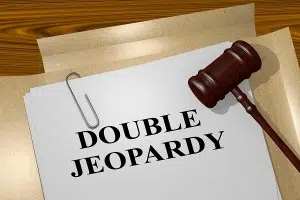The Supreme Court (SC) has reaffirmed that double jeopardy does not apply when the State is deprived of due process despite a previous acquittal.
Under Article III, Section 21 of the Constitution, no person shall be placed in jeopardy, or tried or punished twice for the same offense. This protection prevents individuals from being subjected to harassment or oppression through the abuse of criminal proceedings.
In a Decision written by Associate Justice Ramon Paul L. Hernando, the SC’s First Division set aside the acquittal of Manuel T. Ubarra, Jr. (Ubarra) and remanded the case to the Regional Trial Court (RTC) for further proceedings.
Ubarra, then Vice President of CJH Development Corporation (CJH), accused Atty. Arnel Paciano D. Casanova (Atty. Casanova), then Chief Executive Officer of the Bases Conversion and Development Authority (BCDA), of failing to timely respond to CJH’s letters. He alleged violations of Republic Act No. (RA) 3019 or the Anti-Graft and Corrupt Practices Act, RA 6713 or the Code of Conduct and Ethical Standards for Public Officials and Employees, and Presidential Decree No. 807 or the Civil Service Decree.
Atty. Casanova countered that the letters were not addressed to him but to then BCDA President General Narciso L. Abaya, who had already responded. Atty. Casanova then filed a perjury case against Ubarra.
The Metropolitan Trial Court (MeTC) found Ubarra guilty of perjury. The majority of the prosecution’s evidence was Atty. Casanova’s testimony through his judicial affidavit.
However, the Regional Trial Court (RTC) acquitted him, citing the absence of Atty. Casanova’s judicial affidavit in the case records transmitted to it.
The Office of the Solicitor General (OSG) appealed to the Court of Appeals (CA), arguing that the RTC ignored key evidence and failed to give the prosecution a chance to address the missing affidavit. The CA ruled in favor of the OSG, prompting Ubarra to elevate the case to the SC, claiming double jeopardy.
The SC agreed with the CA, stating that the RTC prematurely acquitted Ubarra without a full review of the evidence.
The SC explained that acquittals are generally final, but exceptions apply when: (a) the prosecution is not given the opportunity to present evidence; (b) the trial is a sham; or (c) there is a mistrial.
In this case, the RTC failed to allow the prosecution to explain or correct the missing affidavit, despite it being filed and admitted by the MeTC. This violated the State’s right to due process, rendering the judgment of acquittal invalid.
The SC reaffirmed that courts must ensure a fair trial for both the accused and the prosecution. It stated:
“Our Constitution protects the right to due process of both the State and the accused in criminal cases. Thus, the guarantee against double jeopardy does not preclude the Court from declaring a judgment of acquittal as void when it has been rendered in violation of the State’s right to be heard and prosecute its case.” (Courtesy of the SC Office of the Spokesperson)
This press release is prepared for members of the media and the general public by the SC Office of the Spokesperson as a simplified summary of the SC’s Decision. For the SC’s complete discussion of the case, please read the full text of the Decision in G.R. No. 249890 (Manuel T. Ubarra, Jr. v. People, October 9, 2024) at: https://sc.judiciary.gov.ph/249890-manuel-t-ubarra-jr-vs-people-of-the-philippines/.
Originally published by the Supreme Court Public Information Office.

